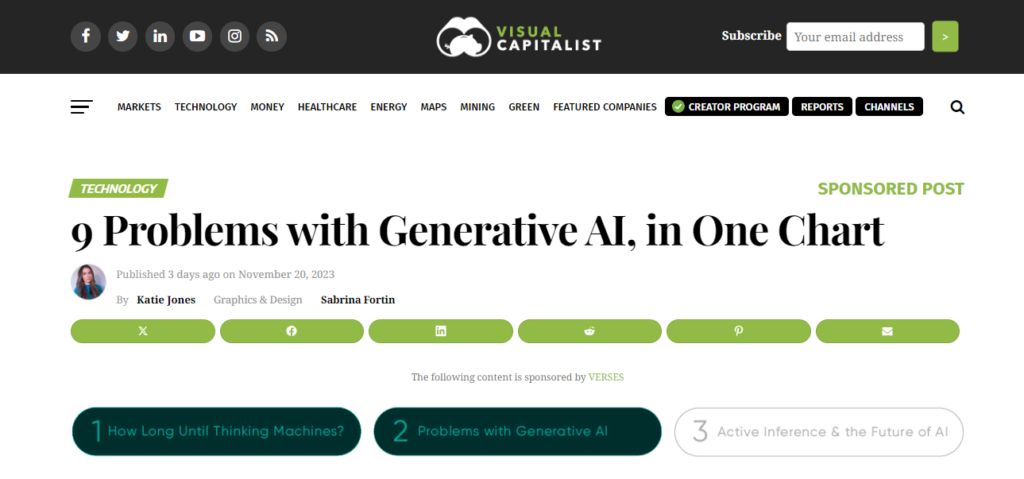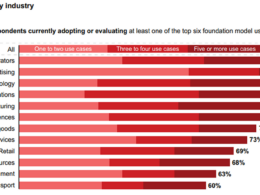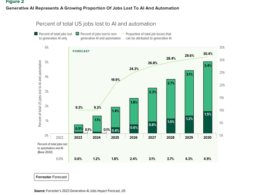the health strategist
institute for strategic health transformation
& digital technology
Joaquim Cardoso MSc.
Chief Research and Strategy Officer (CRSO),
Chief Editor and Senior Advisor
November 23, 2023
One page summary
What is the message?
Generative AI tools present groundbreaking possibilities, but their rapid evolution raises critical concerns across three main themes: quality control and data accuracy, ethical and legal considerations, and complex technical challenges.
As we explore these challenges, it becomes evident that the potential for harm is intertwined with the incredible capabilities of these AI systems.

What are the key points?
1. Bias In, Bias Out (Quality Control & Accuracy):
- Generative AI tends to perpetuate biases present in training data.
- Magnifying biases raises ethical questions and challenges the accuracy of applications.
2. The Black Box Problem (Ethical & Legal Considerations):
- Lack of transparency in decision-making processes.
- Difficulty explaining decisions, particularly during critical errors.
3. High Cost to Train and Maintain (Complexity & Technical Challenges):
- Training generative AI models, like ChatGPT, is prohibitively expensive.
- Costs, exemplified by ChatGPT-4 at $100 million, pose significant financial barriers.
4. Mindless Parroting (Quality Control & Accuracy):
- Generative AIs are limited by the data and patterns they were trained on.
- Outputs may lack the breadth to encompass diverse human knowledge and scenarios.
5. Alignment with Human Values (Ethical & Legal Considerations):
- Generative AIs lack the ability to consider consequences in alignment with human values.
- Need for frameworks ensuring ethical boundaries to prevent harmful applications.
6. Power Hungry (Complexity & Technical Challenges):
- Environmental impact of generative AI is substantial.
- Models like ChatGPT can cost as much as powering 33,000 U.S. households.
7. Hallucinations (Quality Control & Accuracy):
- Generative AI may produce fabricated statements or images in the absence of data.
- Raises concerns about the reliability of outputs and potential consequences.
8. Copyright & IP Infringement (Ethical & Legal Considerations):
- Generative AI tools may appropriate copyrighted work without consent or compensation.
- Initiatives like Copyright Shield aim to address legal concerns but remain contentious.
9. Static Information (Complexity & Technical Challenges):
- Keeping generative AI models updated is resource-intensive.
- Incremental update models offer a potential solution to this technical challenge.
Examples
- The AI-generated “Balenciaga Pope” highlights the potential misuse of deepfakes.
- Chatbot inaccuracies, such as the Google Bard incident, demonstrate the risk of fabricated information.
Statistics
- Training costs for models like ChatGPT-4 can reach $100 million.
- The environmental impact of generative AI models can be as high as powering 33,000 U.S. households.
Conclusion
Generative AI tools hold immense promise but must grapple with significant challenges across quality control, ethics, and technical complexity.
Addressing these issues requires a collective effort from researchers, policymakers, and industry stakeholders to ensure responsible development, deployment, and governance of generative AI technologies.
As we navigate this landscape, balancing innovation with ethical considerations is paramount to harnessing the true potential of generative AI for societal benefit.
DEEP DIVE

This summary was written based on the article “9 Problems with Generative AI, in One Chart” published by Visual Capitalist and written by Katie Jones on November 20, 2o22.
To read the original publication, access https://www.visualcapitalist.com/sp/9-problems-with-generative-ai-in-one-chart











